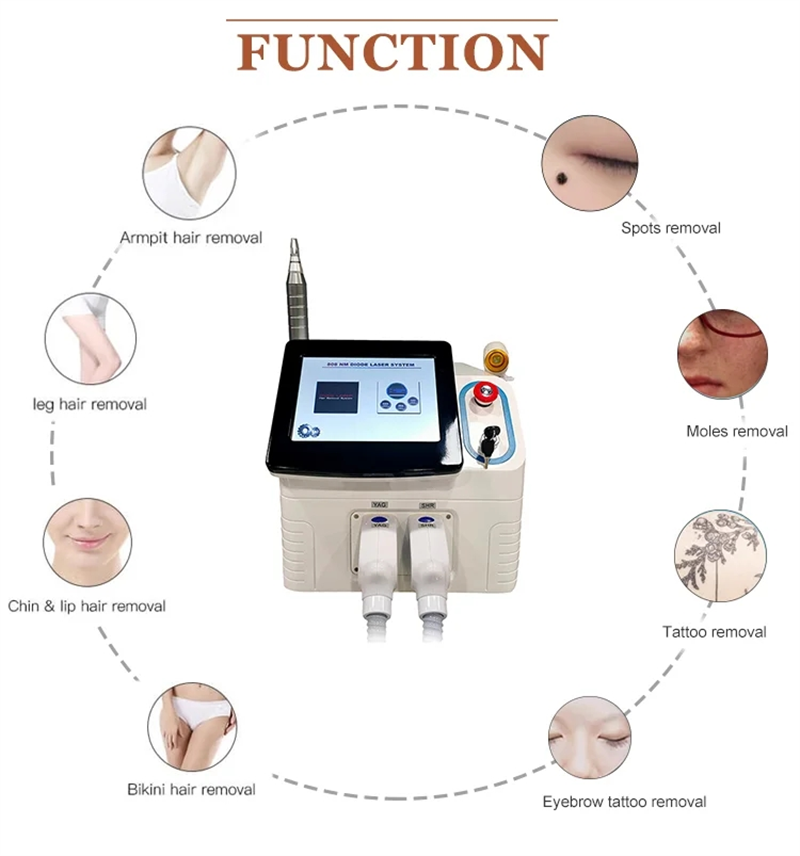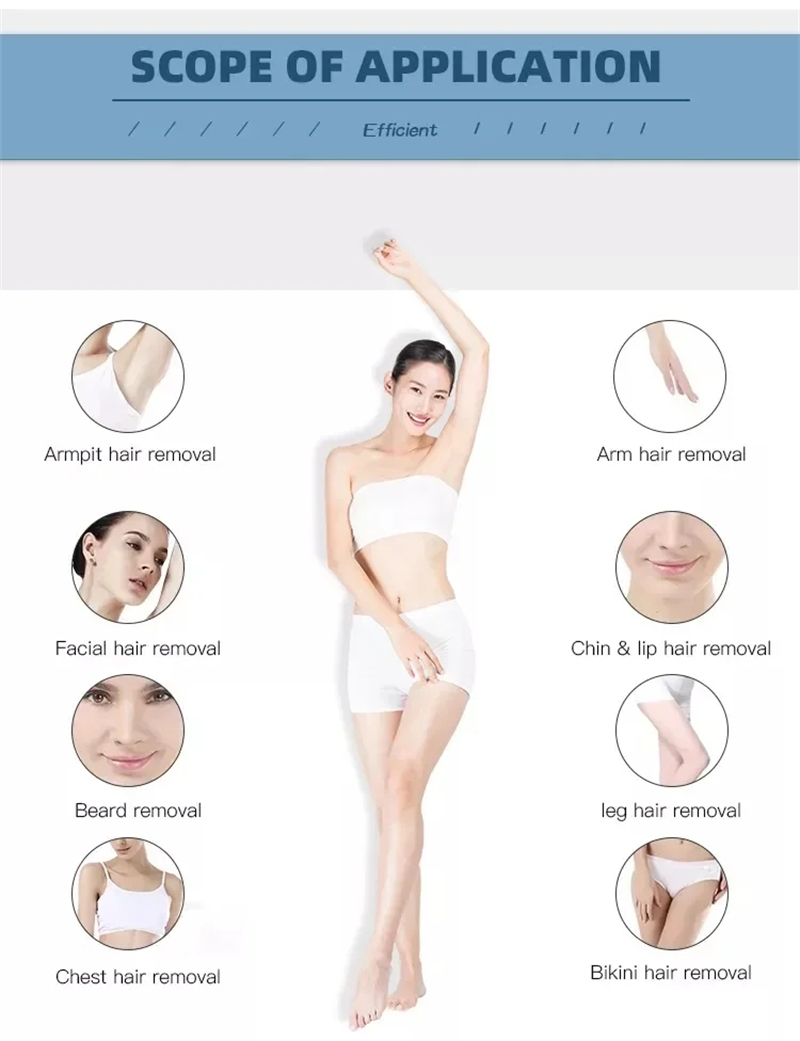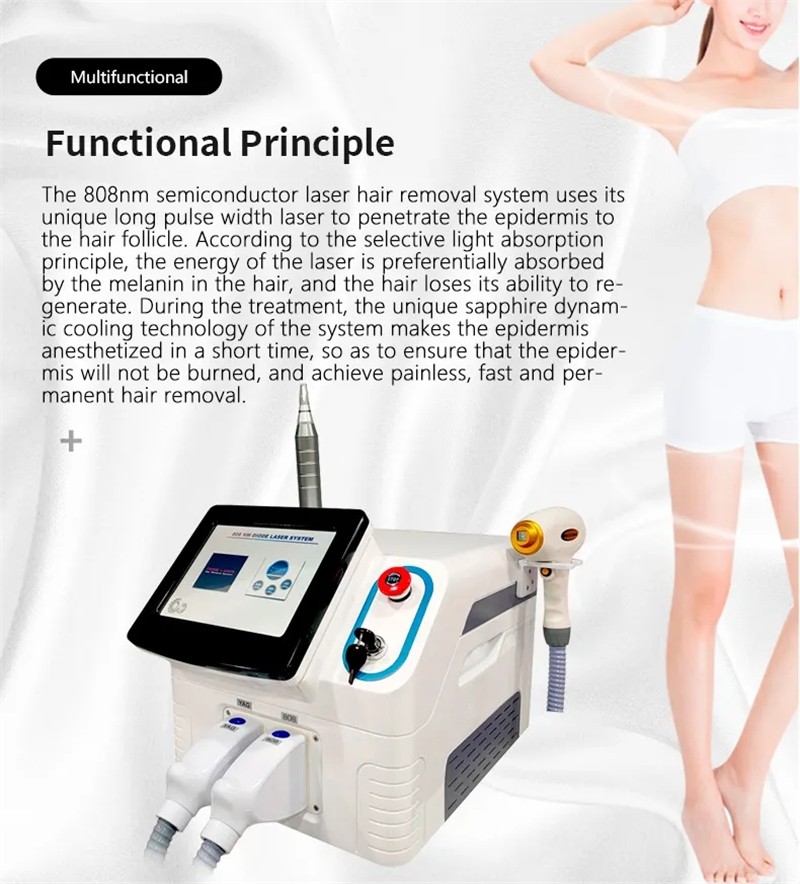
Which hair types are ineffective against laser hair removal machines?
2025-08-12 15:30
Laser hair removal, as a modern hair removal method, has become increasingly popular due to its long-lasting and effective properties. Using precise laser technology, laser hair removal machines destroy the melanin pigment in hair follicles, preventing hair regrowth. While laser hair removal is highly effective, it doesn't effectively remove all hair types.
Some hair types are less responsive to laser hair removal machines, resulting in suboptimal treatment results. This article will explore in detail which hair types are ineffective against laser hair removal machines and analyze the reasons.

How does laser hair removal work?
Before discussing which hair types are ineffective against laser hair removal machines, we first need to understand the basic principles of laser hair removal. Laser hair removal machines use a laser beam of a specific wavelength to target the melanin pigment in the hair. The melanin in the hair absorbs the laser's energy and converts it into heat. This heat is transferred to the hair follicle, heating the follicle structure, ultimately damaging the follicle and preventing hair regrowth. Therefore, the key to laser hair removal lies in the interaction between the melanin pigment in the hair and the laser energy.
What are the key factors in the effectiveness of a laser hair removal machine?
The effectiveness of a laser hair removal machine depends on several factors, the most critical of which are the laser wavelength, skin type, hair color, and hair growth stage. Different hair types absorb laser light differently, which may explain why some hairs may not be effectively removed.
• Laser wavelength: Laser hair removal machines typically use wavelengths between 700nm and 1200nm. Lasers of different wavelengths have different penetration depths, better targeting the melanin in the hair. Shorter wavelengths are better for shallow hair, while longer wavelengths are better for deeper hair.
• Hair color: Laser hair removal works based on the absorption of melanin. The more melanin a hair has, the more it absorbs the laser light. Therefore, darker hair is generally more easily removed by a laser hair removal machine than lighter hair. Black and brown hair absorb laser energy effectively, while lighter hair absorbs less laser energy and may be less effective.
• Hair density and thickness: Hair thickness also affects the effectiveness of laser hair removal. Generally, coarser hair, because it contains more melanin, absorbs laser light more effectively. Fine, soft hair, on the other hand, struggles to absorb sufficient laser energy, resulting in less effective hair removal.
• Hair Growth Phase: The hair growth cycle consists of three phases: anagen, catagen, and resting. Laser hair removal is primarily effective on hair in the anagen phase, as melanin levels in the follicles are highest during this phase. Hair in the catagen and resting phases, on the other hand, absorbs less laser light, resulting in less effective hair removal.

Which hair types are ineffective against laser hair removal machines?
Based on the principles of laser hair removal, we can infer which hair types are less effective against laser hair removal machines. The following is a detailed analysis of several hair types:
1. Light-colored hair
Light-colored hair, such as blonde, light brown, and gray, has a lower melanin content, making laser hair removal machines significantly less effective. Because laser treatments work by converting laser energy into heat through melanin, light-colored hair has a lower melanin content, preventing the laser from being absorbed effectively. Consequently, the heat cannot penetrate deeply into the hair follicles, thus affecting the treatment's effectiveness.
Particularly for very light blond hair, laser hair removal machines are virtually ineffective. For this type of hair, more efficient techniques or more frequent treatments are often required, and satisfactory results may not be achieved with laser hair removal.
2. White Hair
White hair contains almost no melanin, making laser hair removal machines ineffective. Melanin, a key component of laser hair removal, is poorly absorbed by laser energy, preventing the laser from reaching the hair follicles for destruction. Therefore, laser hair removal machines are largely ineffective on white hair.
White hair is often caused by factors such as age and genetics. As the amount of melanin in the hair decreases, the effectiveness of laser hair removal gradually decreases. For some older patients, laser hair removal may even be ineffective against white hair.
3. Fine Hair
Fine hair typically contains less melanin than coarse hair, making it less able to absorb laser light. The effectiveness of laser hair removal machines generally depends on the hair's melanin content: more melanin means greater absorption of laser energy, resulting in better hair removal results. Fine hair, however, has a relatively low melanin content, preventing the laser from effectively focusing deep into the hair follicles, resulting in suboptimal hair removal results.
Although some laser hair removal devices claim to treat fine hair, they may require more treatments than for coarse hair, and results may take longer to show.
4. Dormant Hair
The hair growth cycle is divided into three phases: anagen, catagen, and telogen. During the telogen phase, hair is dormant and the follicles are inactive, making laser hair removal machines ineffective. Laser hair removal is primarily effective on hair in the anagen phase because the melanin content in the follicles is higher during this phase, allowing the laser light to be absorbed by the melanin in the hair and transmitted to the follicles, destroying it. During the dormant phase, hair is not actively growing, so even laser treatment cannot effectively destroy the follicles.
Therefore, laser hair removal effectiveness is significantly reduced for hair that has not yet entered the growth phase. This is why laser hair removal typically requires multiple treatments, spaced out to ensure effective treatment of hair at different growth stages.
5. Gray and light brown hair
Gray and light brown hair contain less melanin, making laser hair removal less effective for these hair types. Although these hair types contain more melanin than blonde hair, they still lack the melanin to absorb laser energy effectively compared to darker hair types, resulting in less effective treatment.
For light-colored hair, some laser hair removal machines may be equipped with special technology or adjust the laser wavelength to enhance their effectiveness, but generally, laser hair removal is limited for gray and light brown hair.

How can I improve the effectiveness of laser hair removal?
While some hair types are less responsive to laser hair removal machines, there are still some ways to improve hair removal results or choose the right treatment plan:
1. Choosing the Right Laser Type
Different laser hair removal machines use different wavelengths of laser light, suitable for different hair types. For example, long-wavelength lasers (such as 808nm lasers) are suitable for deep-seated hair, while short-wavelength lasers (such as Alexandrite lasers) are suitable for shallow-seated hair. Therefore, choosing the right laser device for different hair types is crucial.
2. Multiple Treatments
Because the effectiveness of laser hair removal machines is closely tied to the hair growth cycle, multiple treatments are required to completely remove all hair. Multiple treatments ensure that hair at different growth stages is effectively removed by the laser, increasing the success rate of hair removal.
3. Combination Therapy
For some hair types, laser hair removal alone may be limited in effectiveness. In these cases, combining it with other hair removal methods, such as electric hair removal or waxing, can complement laser hair removal and enhance overall results.
Laser hair removal machines are a highly effective and long-lasting hair removal technology, but they aren't effective for all hair types. Light-colored, white, fine, and dormant hair may be less responsive to laser hair removal machines, resulting in limited treatment effectiveness. Understanding these factors and choosing the appropriate treatment for your individual hair type can help you achieve optimal hair removal results.

Who is KuoHai and what products do you manufacture?
KuoHai is a professional manufacturer and supplier in China, dedicated to producing high-quality beauty instruments and home appliances since 2019. Our factory focuses on laser hair removal machines, ultrasonic cavitation devices, EMS muscle stimulators, and fat freezing machines.
As a direct supplier, KuoHai offers affordable wholesale prices, customized solutions, and OEM services to meet diverse purchasing needs. Buyers worldwide rely on our factory quotes, competitive prices, and reliable quality to build long-term partnerships.
Get the latest price? We'll respond as soon as possible(within 12 hours)







